C3: Connecting Coaches Cognition
A Podcast for the busy coach
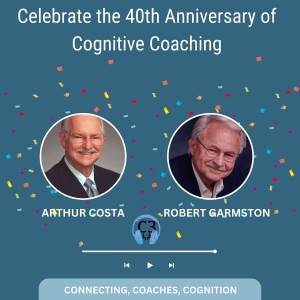
Thursday May 02, 2024
Thursday May 02, 2024
-Art and Bob have worked together for over 40 years at California State University at Sacramento. Cognitive Coaching was born through this relationship. ‘We have these things in common, let's talk further.’
-A coach is used in many different ways, typically in an athletic realm. There is a distinction between these types of coaches and cognitive coaches. A coach is a person who, alongside the person being coached, helps mediate between the person and the experience. The coach helps the coachee pay close attention to the actual experience and all of its dimensions including their own thinking processes, as well as results. The coach is like a median on a highway. The coaches’ intention is to support self-directed continuing learning for individuals. The coach intervenes in the thinking process of the educator.
-Teachers have a map in their mind of where they are and where they are going. They have a plan of action and want some outcomes and have a vision of their kids in their head. A coach tends to illuminate that and make it more explicit, more refined and bring forth thought processes that the teacher may not have thought about. This would happen before the teaching or after the teaching has happened. The coach could discuss with the teacher prior to teaching, after the lesson to reflect on the lesson and learn from it to carry forth their learning. It is a continuous growth cycle. The coach facilitates this cycle to plan and reflect to engage in ongoing learning.
- Deeply buried in the teachers' experiences, knowledge and passions they have answers to their own questions. Teachers can find the answers within themselves. The goal is to build autonomy. Coaches do not need to supply answers. Eventually the goal is that the teacher takes over this reflection and they coach themselves in order to turn over the coaching to the educator. We don't want to build dependency and instead we want to build autonomy. Cognitive Coaching is a developmental process that keeps on going. We are building self efficacy to be self-sufficient with their own innovations, creativity, and generate new and exciting ideas.
-States of Mind: Flexibility, Efficacy, Craftsmanship, Interdependence, and Consciousness. Coaches help others develop these capabilities.
-Positive Presupposition is needed. People act the best way they can in the moment. Communication is a vehicle for important messages. We pay close attention to the total message of what we are receiving. We can detect exactly when someone has moved from distress to eustress or had an ‘ah-ha moment’. We have to live in a place of deep trust and rapport to do Cognitive Coaching well.
-New technology and A.I., as well as great demand on diversity in schools, made it so they are re-examining where Cognitive Coaching fits. The role of the coach is being shifted by A.I. What does Cognitive Coaching look like for the 22nd century? They are under study on how to adjust to those changes while never losing the human capacity to relate to one another.
-We are learning in Cognitive Coaching how to be true, deep listeners. We don’t interrupt, we do not agree or disagree. It is an expression of love and humanity. It is an expression of you are not alone as we move through this crazy world. We believe that Cognitive Coaching goes well beyond the schools or the coaching setting. It helps to create a more loving environment and a better humanity. We dedicate ourselves to that goal as it is what the world needs now.
-They have a new book coming out this year. It hones in on key principles and values of Cognitive Coaching and how they apply in different settings: business, health sciences, clergy, and other differing fields.
-We need to make an effort to maintain our best intentions and best services.
-Advice to a coach - The transformation when you learn Cognitive Coaching is like a new illumination and a real mind shifter. You give up old ways and adopt new and more powerful ways. It builds strengths, fortitude, and commitment. It is a gradual transformation and builds a new coherence in your life. It gives you a new outlook. It is a transformation of your thinking.
-Have patience with one’s self, patience with how it takes time to learn some of these skills, and patience in finding collaboration in the journey. There is something about learning in a group, in which the group is learning to help each individual, and simultaneously each individual is learning to help the group. Each profits from each other’s thinking. The interchange is so important.
-Coaching is a service leadership type of role. We believe if the other person comes first, the learner. Then we all learn as a result of that process.
-The Thinking Collaborative is an organization mechanism in which people are trained to coach, learn aspects of coaching relationships, seek support, and spread this work.
Connect with Art and Bob-
-https://www.thinkingcollaborative.com/

Wednesday Apr 03, 2024
Wednesday Apr 03, 2024
-Connections Over Compliance- Our nervous systems are social systems. The educational system consists of us being with other people all the time. COVID created a huge social loss. It is even more relevant in this time.
-Attachment builds the brain. “We work for people we like; we respect people who respect us.”- Rita Pearson
-Touchpoints where you resonated with each other, student and teacher. It was through relationship and discipline. Relationships are key to making forward progress.
- Trauma logic, relationship resistance. Patterned, repetitive experiences learning how to create, serve and return between two people.
-Neuroplasticity - every experience that we encounter has the ability to structurally and functionally change us. Growth mindset and accessing the executive functioning.
-All behavior is a form of communication. All behaviors are indicators and signals from the nervous system. ‘I can learn a bit more.’
-Modeling, Co-teaching, and support for educators. Walking side by side with educators.
-Connections over compliance through revelations in education.
-Self-reflection: retreat and take some breaths to compassionately detach so you can be fully present.
Connect with Lori:
Website: revelationsineducation.com
New Book: Intentional Neuroplasticity
Body and Brain Brilliance Book - Coming soon
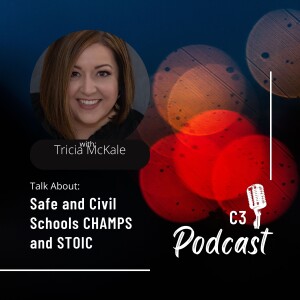
Wednesday Mar 06, 2024
Wednesday Mar 06, 2024
Tricia McKale
Show Notes:
-Preparedness meets lucky opportunities - Middle school teacher turned Instructional Collaborator via Jim Knight.
-Working with adults with a lot of trial and a lot of error. Found that the behavior management system was getting in the way of us doing instructional coaching. Behavior is where my life is at and I was a Tier 3 student in school.
-C.H.A.M.P.S. - Conversation. Help, Activity, Movement, Participation, Success. Think about different modes of learning throughout the learning day. That is one portion of a really comprehensive behavior management plan is your expectations for instructional activities.
-Moving toward and a real emphasis on the S.T.O.I.C framework. S.T.O.I.C. is a culmination of all the variables of some level of power and control over. How do we set up a system of observation to provide feedback to children? An umbrella under which C.H.A.M.P.S. belongs.
-All the acronyms - We need to clarify and unpack all the packages of those acronyms for our new teachers and all of us. We need to find a way to navigate through them fluidly to best serve the needs of our kids and educators.
-Creating a system or framework of support for all staff. We want teachers to apply it in order to have an unmistakable impact. Truly MTSS as leaders and coaches- comprised of both evaluators and nonevaluators to create that for staff. Let leadership teams proactively build that staff support.
-Behavior support is an underpinning to good instruction. However, if you have good instruction that may eliminate many big behavioral issues within your classroom. How to leverage Coaches within Tier 1? Where are we having system challenges? Systemic change is the key to change over time.
-Interdependence between honoring your administration, your system goals, and your educators, “How do we navigate this system-rich environment?” How do I actively engage this group of kids?
- Can you create a sense of urgency without a sense of overwhelm? Is that possible? What are the small steps? What were the expectations not being met?
-If you were to coach someone who was going into coaching and you could only say what you could say, what would you say?
-Lets look at the system in which coaching was occurring.
- If you were to say someone was headed into coaching and they had one hard thing to face, what would you tell them? How do you find the interdependence between balancing administration and system goals while honoring them, as well as the teacher in front of you, and respecting the finesse, and nuance to help each other all see each other’s perspective and build that remarkable synergy?
-Validate all entities, and rock the boat, while staying in it. What are our true beliefs? What are those really big challenges? How might we master the communication challenges to make that happen? We have much more in common than we have in different. Shut off the advice monster.
-You have to suspend the idea that you have all the answers to push forward.
- We do the best we can. Of course, it is difficult to receive constructive feedback of any kind”: we have to stop thinking of ourselves as perfect entities. If we think of ourselves as “goodish entities” then we are on the right path!”
-Stop solving, start asking, efficacy! Our goal is to bring out the efficacy in others. Stop solving, start asking.
-STOIC Screener in the book to help provide that data as a third point in a coaching conversation. How to coach various coaching situations.
-It is not us, it is always them. You took the tools, ran, and put them into place. Small changes made such a huge difference. Use a solid research-based approach through a coaching dialogue.
-Holding the individual and the system all in one is pivotal.
-Meet attack with inquiry.
-We tried. Master the starfish effect. Make a difference to that one. The day-to-day wins have to be enough to sustain you.
Connect with Tricia:
safeandcivilschools.com

Wednesday Jan 31, 2024
Wednesday Jan 31, 2024
Sherry St. Clair is the founder of Reflective Learning LLC, an educational consulting agency based in Kentucky. Her organization works with schools around the world, creating specialized training and coaching services for school administrators and educators. She holds a master’s degree in Instructional Leadership and a Rank 1 in Instructional Supervision.
Sherry has served as a Senior Consultant for the International Center for Leadership in Education and Houghton Mifflin Harcourt. As an international consultant, Sherry draws from her rich experience at various levels of public education–teaching elementary school, being an administrator in a high school of 1,300 students, working as a state consultant, and creating and facilitating virtual courses. Sherry is a highly regarded national speaker and consultant, providing educational agencies with expertise in instructional leadership, effective classroom practices, classroom walkthroughs, effective use of data, and guidance on how to create structures for successful classroom coaching. Coaching schools to best meet the needs of all students is Sherry’s passion.
Sherry is a contributing author to Effective Instructional Strategies Volume 2 published by the International Center for Leadership in Education and 100 No-Nonsense Things that All Teachers Should Stop Doing. She has published numerous professional learning activity guides and facilitated webinar series focused on leadership and effective instructional practices. Additionally, Sherry developed virtual instructional workshops for the CTE Technical Assistance Center of New York. In partnership with the Successful Practices Network, Houghton Mifflin Harcourt, and The School Superintendent Association (AASA), Sherry has recently been a part of bringing innovative practices to scale. Her publication, Coaching Redefined: A Guide to Leading Meaningful Instructional Growth, was released in June of 2019.
Show Notes:
-Intentional coaching is to help both teachers and coaches think about the intentional steps needed to grow in a given area.
-Take smaller steps towards those big goals and be intentional with those steps. What is one small change you can make? Go on a journey to grow from where we are and keep moving forward.
-Student discourse- If we don't have student discourse in a classroom then where do we start? If we have a little, how do we start? The book's purpose is to look at what is out there in research around proven ways for students to learn and think about how we can help teachers implement those effectively in their classrooms.
-Students need to feel safe and have time for those academic conversations. Coaches need to think of the small incremental steps a t teacher can do to meet the true student discourse and big gains in student learning.
-When we don't layer on so many things on our teachers' plates and instead have an intentional focus on those small steps, we see huge growth.
-Coaches have to be a filter for things happening within their school system and it is truly an honor. You have to keep in mind the broader goals of the school. How do I pull all of that together?
-We only keep trying to get better and better. Just keep swimming. Let it go. Shake it off. Just keep moving forward. Just keep improving a little bit more each day. There are some days you can run fast towards your goal. There are some days you can walk towards it. And there are some days you need to just rest. And it is all about moving forward.
-Be mindful of the listening tour as a coaching superpower. Being female is powerful. We are compassionate as instructional leaders.
-Autonomy, Mastery, and Purpose
Connect with Sherry:
Website: Reflective Learning, LLC
Twitter: @Sherrystclair
Facebook: Sherry St Clair
Instagram: Sherryst.clair
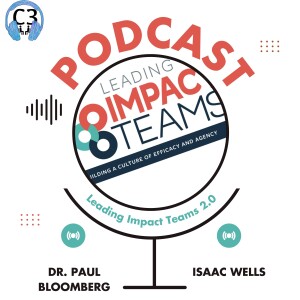
Wednesday Jan 03, 2024
Wednesday Jan 03, 2024
-Leading Impact Teams: Building a Culture of Efficacy and Agency -New book - we wanted to share more of the explicit ‘how', as well as making sure equity is up front and present in this edition. It is infused with culturally responsive sustaining education practices that are asset based, where we look at assessments through the theme of culture. We all have different cultures and are coming together in a classroom. We can honor the cultures of the different people within our classrooms or we can deny them and assimilate and be one. It is better if we honor each person's cultural backgrounds and we make more connections and we learn more.
-What is inquiry? What is it and what is it not? If we want our students to have agency, then our teachers have to have agency too, all while meeting school goals but having flexibility. How are we going to contribute back to where and how we learn?
-At Core Collaborative we practice what we teach. We are always learning and reflecting. We are taking input from so many different sources, a massive learning community.
-Efficacy’s 4 sources: safety, models of success/success criteria, feedback, and mastery moments. Agency is the opportunity and ability to take control of your own life. To make decisions that help yourselves and help others. Looking towards collective teacher efficacy.
-Teachers have influence and agency over their classroom. Goal consensus, teachers gathering with the principal. Are we actually looking at the data collaboratively together, brain storming what our goals could be as teachers, and creating those goals collectively? Having cohesion, where are we going three years from now? We need agency over what we are doing within our schools. Are our interventions quality? Self efficacy moving to teacher collective efficacy.
-Design thinking to enhance PLC work. Starts with the core, empathizing with your client- your students, parents, and teachers. We started doing a lot more empathetic interviews to be better and be able to understand the root cause of the problem because we were talking to the people who the problem mostly impacted. Empathy and prototyping phases really set this inquiry apart. This work really excelled our work within high school PLCs.
-We have to honor parents on their terms, honor their culture and the way they see education. We need not to make it about what we need, but about what do you need? What can we do better for you?
- As educators, we need to acknowledge the cultural strengths that kids already have. These strengths can be used as a source of knowledge to build from. The asset based approach is vital.
-They are already whole. We have to speak about them as whole people. No one in the room is broken, you all are totally whole. The system is broken. The more that we look at our deficits, the more we find.
-Learning is a partnership and it happens socially before it happens academically. At the heart of the model is to develop self empowered learners and that is another way to think of agency. Students who are able to live in the world with a belief that they can have an impact on their lives and the lives of others with the power and spirit to take chances and try that.
-Teaching kids how to learn to learn.The better you understand yourself, the better you are able to understand others.
Connect with Peter and Isaac:
www.thecorecollaborative.com
@thesocialcore or @corecollaborative
Facebook - Search Leading Impact Teams
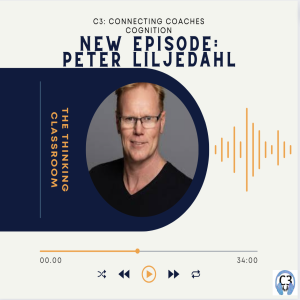
Wednesday Dec 06, 2023
Wednesday Dec 06, 2023
-Building thinking classrooms- around the notion that students spend time in classrooms not thinking. Many structures are not designed for thinking, and instead for conformity and compliance. 15 years of research before the book, and the research continues.
-One of the least conducive places to have students do thinking is at their seat writing in their notebook, but one of the most conducive spaces for students to do thinking is standing in random groups of three, at a whiteboard or something vertical and erasable. It is about getting them up and thinking.
-Task in relation to the student. If we want our students to think we have to give them something to think about. To be a thinking task it needs a particular relationship to the student.
-The whiteboard is a better space for that thinking to manifest. Everyone has to be able to access the task.
-Whiteboard- Everyone is oriented with the work the same way, they can see other students’ progress, I can access their learning more readily, I as the teacher can intervene right now. Standing is just so much better than sitting. When students are sitting they feel anonymous. The further from the student, the more anonymity. When they feel anonymous they are more disengaged.
-More engagement from a question if written on a whiteboard, as opposed to printed on paper.
-You have five minutes. They are with you on your feet and talking to each other. Research shows beyond five minutes, the more passive students become and the transition to being an active learner is harder.
- In a thinking classroom you say the minimum possible to start question number one. Then we can give them another question and another. We can never unsay what we say at the beginning. The moment we tell them how to do it, we have sucked the thinking out of the task. Need to bring order to their thoughts.
-Mimicking: Template for exactly how to do this problem. Mimicking is not the same as thinking or learning. It is mastering or memorizing routines that they truly need to make meaning. Students take the process and plug it into the template teachers present. Mimicking always runs out. How do we break these habits? How do we help students and ourselves break these habits? We have to break the habit ourselves and then support them and give them success.
-Students don't listen to what we say, they listen to what we do. When teachers are too perfect, students try to be too perfect.
- I can’t hear what you are saying, your actions are too loud.
-Divergent vs. convergent thinking - Gallery walk. The teacher is the guide and we are taking a tour. We are going to look at little portions of the boards. Present the tentative learning with students. Others talk about the board work, we invite them to think about it and draw conjectures about what it is, and then that creates a thinking discussion about this and engages in a variety of different boards this way. Are they thinking?
- We are the educators, we are creating the experience. We are very deliberate about what that experience is.
-Random groups - creates a space where students can actually learn from each other. Random groups is the engine to make all of this work.
-How can I help teachers’ notice things?
-Try to pull from teachers something that is absolutely positive about what they already do. What is the best lesson you ever taught? How do we amplify their successes instead of the urgency of the immediate?
Connect with Peter:
Buildingthinkingclassrooms.com
Facebook: Groups→ Search “Building Thinking Classrooms” and find your group 50+
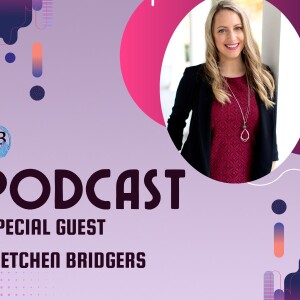
Wednesday Nov 01, 2023
Wednesday Nov 01, 2023
Gretchen is a National Board-certified elementary school teacher from Charlotte, NC.
In 2006, Gretchen received her bachelor’s degree at Marist College in Poughkeepsie, New York. In 2010, she received her master’s degree in Curriculum and Supervision from the University of North Carolina at Charlotte.
Gretchen taught grades 2, 3, and 5 before transitioning into the role of a New Teacher Development Coach for The New Teacher Project [TNTP]. During this time, she also published her first book for new teachers called “Elementary EDUC 101: What They Didn’t Teach You in College” to help prepare future teachers for the realities of life in the classroom.
For more than a decade, Gretchen has passionately mentored and coached educators, led professional development experiences for school building staff, and presented at district and national conferences as the owner of Always A Lesson. Her impact continues to amplify serving educators worldwide through her blog, Empowering Educators podcast, classroom resources, professional development courses and personalized coaching opportunities. She has since co-authored a book with over a dozen other elite educators called “Teachers Who Know What To Do- Experts In Education” to share proven strategies that transform classrooms and leaders around the world as well as written her third book “Always A Lesson: Teacher Essentials for Classroom & Career Success” that comes out Spring 2024.
Whether you’re teaching a lesson or learning one yourself, there’s Always A Lesson.
Show Notes:
-Strategies for super collaborative relationships, being an actual coach, under your leadership, and with your style.
-Time and consistency are key- -What worked in coaching? What can we replicate?
-Coaching debriefs: no tangents, time-stamp, be open and honest. We are protecting our time.
-That was a textbook example- super focus. You have to keep laser focus. Know what you are trying to accomplish and keep it consistent. Always connect it to the evaluation rubric.
-Name the thing that you notice, and add one thing they can do to improve it. The important piece is to reflect on what happened, and also name one thing to improve it!
-Transparency and understanding that we are both learners is so huge! 4 aspects of instruction and order matter, pay attention to the sequencing. Lesson design as opposed to lesson planning. Do you do them consistently at a high level? Logistics and details?
-Get to know your teachers and see where they are at. Please be present in the building. Be aware of the culture, keep tracking, and build in results. If you can set the system up for yourself, especially in a quantifiable way, make sure to show your impact!
-GO BE GREAT! - You are now empowered more than before!!! Do it and do it well!
-Truly listen and ask deep questions.
Connect with Gretchen:
Alwaysalesson.com
New Book Coming Soon: Teacher Essentials for Classroom and Career Success
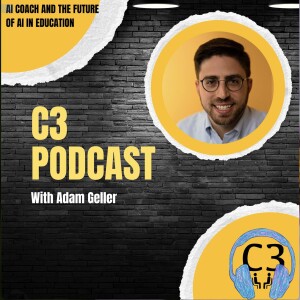
Wednesday Oct 04, 2023
Wednesday Oct 04, 2023
Adam Geller is the founder of Edthena and author of Evidence-Based Practice. He started his career in education as a science teacher in St. Louis, Missouri. Since 2011, Adam has overseen the evolution of Edthena from a paper-based prototype into a research-informed and patented platform used by schools, districts, teacher training programs, and professional development providers.
Adam has written on educational technology topics from various publications, including Education Week, Forbes, and EdSurge. He has been an invited speaker about educational technology and teacher training for conferences at home and abroad.
AI Coaching is a video on the left, and the AI Coach acts as a guide on the side to help teachers observe themselves. It is a (chat style of communication), not telling a teacher what to do, but rather asking questions and opening the doors so that they can walk through them and learn about themselves.
Lack of bias with AI Coach, never switches from facilitative to directive coaching.
This is the coaching that can happen between real life coaching. It helps to empower educators to own their own professional growth.
The coaching conversation can start and stop as needed for the educator who is investing in coaching. A real pause button.
Double take moment for Adam: Survey information was presented, a 30-year veteran, was skeptical and was also impressed with the process and learned about her students in her classroom.
“Ah- ha,” moments analyzing video - seeing the things we don't see. It highlights the true goal of professional learning. We all want to continually increase effectiveness. The power of this tool is huge and given what they have been asking for all the time.
-Continuous improvement over time… improve small nuances.
Creating a place of safety for those teachers and professional learning contacts and coaching contacts. Creating a private space.
I am human and I have opportunities to be better. AI is impartial and has no bias.
Challenges- how do leaders ask to have AI-powered tools in our schools or classrooms? How are these moderated? How are these being implemented?
It is asking me questions as opposed to telling me what to do.
Personalization of PD - In-person and AI Coach
Edthena - AI Coach - what is coming for the next decade?
It is coming, ... Subject-specific, Pedagogically sound, questioning related exact things happening in that classroom?
Respect teachers as professional adults, and learners as well as give them a lot of agency!
FREE TRIAL OF EdthenaAI: tryaicoach.com/c3podcast
Connect with Adam Geller
Website:https://www.edthena.com/
pltogether.org
Twitter:@edthena
Evidence of Practice Book
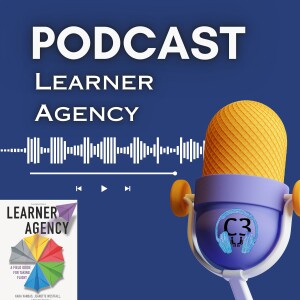
Wednesday Sep 06, 2023
Wednesday Sep 06, 2023
Learner Agency: A Field Guide for Taking Flight is a boots-on-the-ground resource for those who wish to foster greater agency for students and adults alike within their classroom, school, or school system. Written by practitioners who have experienced the triumphs and struggles first-hand, the book offers a framework for moving from building knowledge to making meaning and applying the understanding of practices and systems that support agency.
-Aspired to write this book based on our common work within a district where the three authors came together. Our hope with agency is for students to understand themselves as learners, build their identity as a learner, and learn what to do when they don't know what to do, as well as learn what to do with a bit of independence and understanding they need to move it forward. Kids need time and practice! Fail, learn, and get up and try again! That was the fuel of this project.
-Building a recipe to accelerate learning. We wanted to share the experience and spread the word about what we found that worked. Every time we shared it worked for them too. We wanted to bring that food for thought, and how do we reframe what learning should look like, when we have the opportunity..
-COVID has taught us to think more about our learners. To think about who is in the seat and their means they need to learn anything. How to learn and the dispositions they need in this ever-changing world.
- Push learners to the deep! We have to be ok with that. We need dialogue and discourse.
-We need clarity about what success is. What does it look and sound like?
-When kids have clarity about what is expected of them they are much more likely to take on a challenge and their anxiety goes down.
-Let us know what good learners do.
-What will this look and sound like in my classroom?
-Secret Sauce: Accountability with students and what they were learning. Where are you, where are you going, what do you do when you are stuck?
-The heart of the student agency is building efficiency at every level.
-Mindset shift - get stuck and unstuck all the time.
-Honor the learning process = the more successful the learning is.
-Sharing your story is so important.
-Does a learner know where they are and speak to this?
-Mastery moments with upward spirals.
-Tell your story to build capacity.
-Does it align with your graduate profile?
-Celebrate every step of progress!
-Dialogue and discourse.
-Get comfortable with being uncomfortable. Permission to ask questions that are hard. wE have permission to try another way. We have permission to give ourselves time to learn something, before we have to do it.
-Mastery Moments
-We are doing so much right, and we need to fixate on that, not the small errors along the way
-If we shift our focus, everything shifts!
-Celebrate the wins.
-Permission needs to be granted. What are you learning? And what does that look like? Does the learner know what that looks like?
-You are changing outputs not inputs.
Connect with the authors:
@TheSocialCore @MimiToddPress
-Affirm, push, inspire to make a difference in the life of learners - Katie Martin!
-Be the learner, you want all to be!
-Mastery moments happen, celebrate!
-Still, I am learning.
-Listen authentically and give authentic feedback.
-Listen. Ask questions to get to listen.
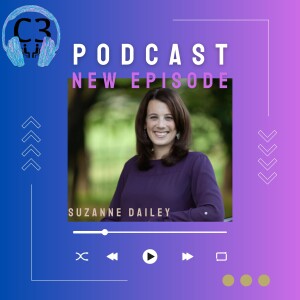
Wednesday Aug 02, 2023
Wednesday Aug 02, 2023
Suzanne Dailey is an instructional coach in the Central Bucks School District, where she has the honor and joy of working with over 500 elementary teachers and 8,000 students. She teaches model lessons, facilitates professional development sessions, and mentors teachers to be the best for the students in front of them.
Suzanne is Nationally Board Certified, a fellow of the National Writing Project, and has a Masters Degree in Reading. She is dedicated to nurturing and developing the whole child and teacher and presents these topics at a local, state, and national level.
Suzanne is the author of Teach Happier this School Year: 40 Weeks of Inspiration & Reflection and the host of the popular weekly podcast, Teach Happier.
-Suzanne has spent 10 years as an instructional coach. She coaches over 500 educators in 15 elementary sites, currently. Prior to that, she was a 4th grade educator and a reading specialist.
-”As an instructional coach I get to impact more students, by impacting their teachers. Knowing that there are really big ripple effects happening between fifteen buildings is a huge responsibility but also such a wonderful privilege and opportunity each day. No two days are the same but I feel the impact is more widespread.”
-Professional Development and Personal Development - teachers need personal development. We need to affirm who we are, and what we need, as the person behind whatever our role is.
-Teachers are not superheroes, we are real humans who need to take care of our own selves and families at home, before we can really show up beautifully for kids.
-Approach tasks in the two pronged approach of personal development and professional development.
-Adaptations have been so huge since March 2020 - look at that list, but look at the trends that will move us forward!
-Science of Reading- small tweaks to make our instruction so much more impactful. Phonics explicitly and systematically - building readers!
-Knowing more, so we get to be a little bit better for the kids in front of us!
-Student and teacher wellness- student and teacher readiness.
-Small shifts, Big gifts - Teach Happier.
-What is in your diet? - What podcasts are in your ears? What news feeds are in front of our faces? What can we control and navigate with small shifts? What is within our realm of influence?
-How might we celebrate our brand new teachers in a similar way to our retirees? We all have fought through the year, how might we make everyone feel acknowledged? How do we overtly honor and acknowledge teachers making it through their first year?
-How do we get someone from, year one to year 30?
-Do your work and also, gather yourself beyond the role.
-Every year is a huge journey! Honor that all the way through!
-Conscious Acts of Kindness
-”I don’t know if I’ve done enough!” - Master Teacher - Goes to show no matter how great we are, no matter how impactful as teachers we are, we carry so much with us as teachers. And that emotional lift, day in and day out, is a real thing. But I think it is finally being acknowledged and we are getting a little more space to share that.”
-When we know we have each other, that is the key to gaining and retaining great educators!
- People, People, People - are we seeing the person behind the student, teacher, educators, or administrator? How can we flex?
-Little shifts of language - as inclusive as possible - I can’t wait to work together…we, us, let’s - just softens every interaction.
-HAVE A WONDERFUL SCHOOL YEAR!
Connect with Suzanne:
Twitter: @DaileySuzanne
https://suzannedailey.com/
https://suzannedailey.com/podcast
A Podcast for the busy coach